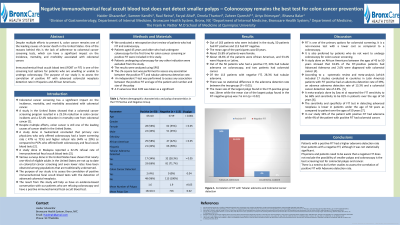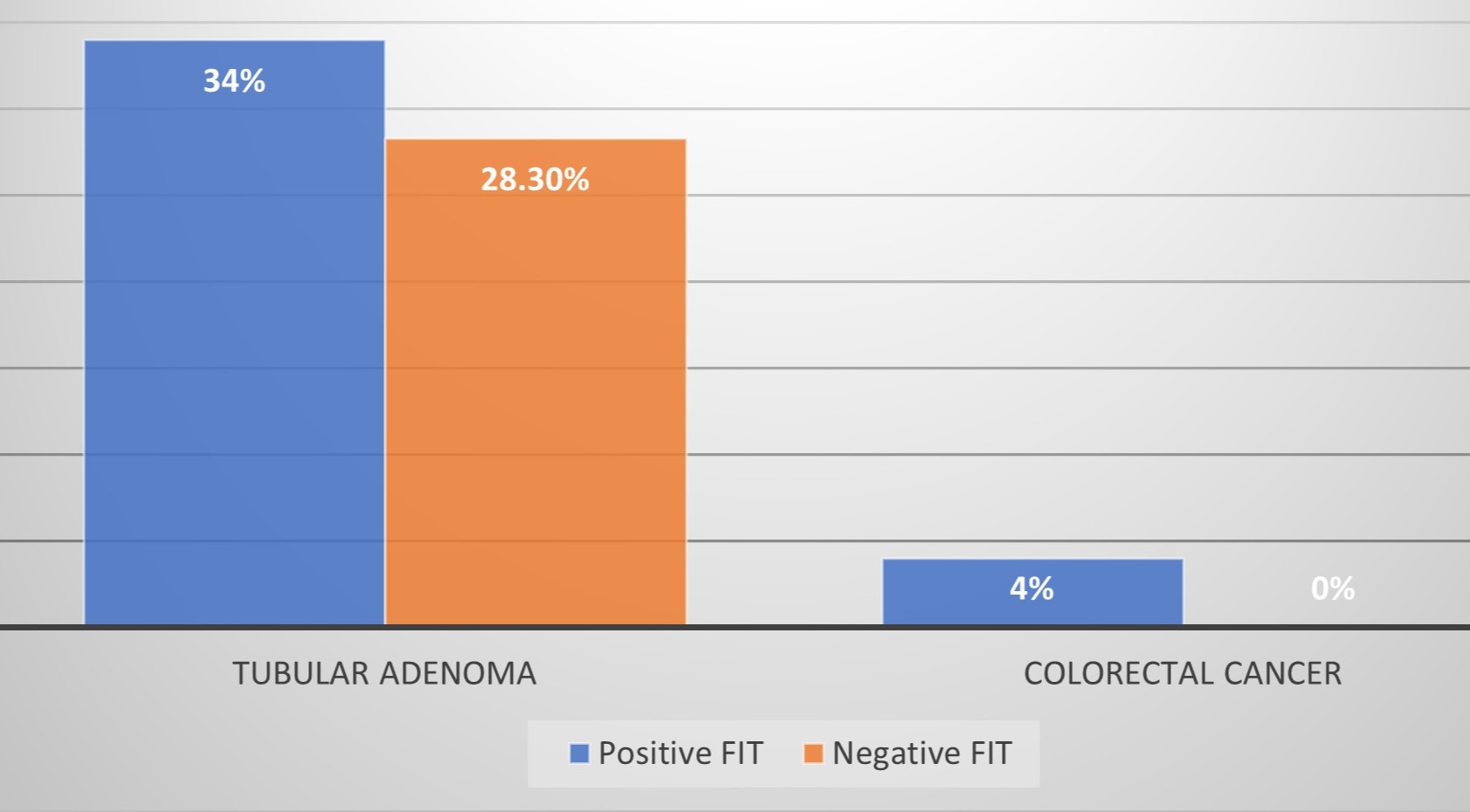Tuesday Poster Session
Category: Colorectal Cancer Prevention
P3833 - Negative Immunochemical Fecal Occult Blood Test Does Not Detect Smaller Polyps: Colonoscopy Remains the Best Test for Colon Cancer Prevention
Tuesday, October 29, 2024
10:30 AM - 4:00 PM ET
Location: Exhibit Hall E

Has Audio

Haider Ghazanfar, MD
BronxCare Health System
Bronx, NY
Presenting Author(s)
Haider Ghazanfar, MD1, Sameer Kandhi, MD1, Raul Reina, MD1, Faryal Altaf, MD1, Ornela Thartori, MD1, Zaheer Qureshi, MD2, Ariyo Ihimoyan, MD1, Bhavna Balar, MD1
1BronxCare Health System, Bronx, NY; 2The Frank H. Netter M.D. School of Medicine at Quinnipiac University, Bronx, NY
Introduction: Despite multiple efforts to prevent it, colon cancer remains one of the leading causes of cancer death in the United States. One of the reasons behind this is the lack of adherence to colorectal cancer screening tests, which can have significant impact on the incidence, mortality, and morbidity associated with colorectal cancer. Immunochemical fecal occult blood test (iFOBT or FIT) is one of the screening test options for patients who are unwilling or unable to undergo colonoscopy. The purpose of our study is to assess the correlation of positive FIT with advanced colorectal neoplasia detection rate in Hispanics and African Americans.
Methods: We conducted a retrospective chart review of patients who had FIT and colonoscopy. Patients age 45 years and older who had undergone colonoscopy for the first time for colon cancer screening or positive FIT were included in this study. Patients undergoing colonoscopy for any other indication were excluded from the study. The chi-square test assessed any association between the positive FTT and tubular adenoma detection rate.
Results: Out of 163 patients who were included in the study, 50 patients had FIT positive and 113 had FIT negative. 55.8% of patients were female. The mean age of the participants was 60 years. 46.6% of the patients were African American, and 53.4% were Hispanic or Latino. Out of the 50 patients who had a positive FIT, 34% had tubular adenoma on colonoscopy, and two patients had colorectal cancer. Of the 113 patients with negative FIT, 28.3% had tubular adenoma. There was no statistical difference in adenoma detection rate between two groups (P > 0.05).
Discussion: Patients with a positive FIT had a higher adenoma detection rate than patients with a negative FIT, although it was not statistically significant. Physicians and patients need to be aware that a negative FIT does not exclude possibility of smaller polyps and colonoscopy is the best screening test for colorectal polyps and cancer.

Disclosures:
Haider Ghazanfar, MD1, Sameer Kandhi, MD1, Raul Reina, MD1, Faryal Altaf, MD1, Ornela Thartori, MD1, Zaheer Qureshi, MD2, Ariyo Ihimoyan, MD1, Bhavna Balar, MD1. P3833 - Negative Immunochemical Fecal Occult Blood Test Does Not Detect Smaller Polyps: Colonoscopy Remains the Best Test for Colon Cancer Prevention, ACG 2024 Annual Scientific Meeting Abstracts. Philadelphia, PA: American College of Gastroenterology.
1BronxCare Health System, Bronx, NY; 2The Frank H. Netter M.D. School of Medicine at Quinnipiac University, Bronx, NY
Introduction: Despite multiple efforts to prevent it, colon cancer remains one of the leading causes of cancer death in the United States. One of the reasons behind this is the lack of adherence to colorectal cancer screening tests, which can have significant impact on the incidence, mortality, and morbidity associated with colorectal cancer. Immunochemical fecal occult blood test (iFOBT or FIT) is one of the screening test options for patients who are unwilling or unable to undergo colonoscopy. The purpose of our study is to assess the correlation of positive FIT with advanced colorectal neoplasia detection rate in Hispanics and African Americans.
Methods: We conducted a retrospective chart review of patients who had FIT and colonoscopy. Patients age 45 years and older who had undergone colonoscopy for the first time for colon cancer screening or positive FIT were included in this study. Patients undergoing colonoscopy for any other indication were excluded from the study. The chi-square test assessed any association between the positive FTT and tubular adenoma detection rate.
Results: Out of 163 patients who were included in the study, 50 patients had FIT positive and 113 had FIT negative. 55.8% of patients were female. The mean age of the participants was 60 years. 46.6% of the patients were African American, and 53.4% were Hispanic or Latino. Out of the 50 patients who had a positive FIT, 34% had tubular adenoma on colonoscopy, and two patients had colorectal cancer. Of the 113 patients with negative FIT, 28.3% had tubular adenoma. There was no statistical difference in adenoma detection rate between two groups (P > 0.05).
Discussion: Patients with a positive FIT had a higher adenoma detection rate than patients with a negative FIT, although it was not statistically significant. Physicians and patients need to be aware that a negative FIT does not exclude possibility of smaller polyps and colonoscopy is the best screening test for colorectal polyps and cancer.

Figure: Correlation of Immunochemical Fecal Occult Blood Test (FIT) with Tubular Adenoma and Colorectal Cancer Detection
Disclosures:
Haider Ghazanfar indicated no relevant financial relationships.
Sameer Kandhi indicated no relevant financial relationships.
Raul Reina indicated no relevant financial relationships.
Faryal Altaf indicated no relevant financial relationships.
Ornela Thartori indicated no relevant financial relationships.
Zaheer Qureshi indicated no relevant financial relationships.
Ariyo Ihimoyan indicated no relevant financial relationships.
Bhavna Balar indicated no relevant financial relationships.
Haider Ghazanfar, MD1, Sameer Kandhi, MD1, Raul Reina, MD1, Faryal Altaf, MD1, Ornela Thartori, MD1, Zaheer Qureshi, MD2, Ariyo Ihimoyan, MD1, Bhavna Balar, MD1. P3833 - Negative Immunochemical Fecal Occult Blood Test Does Not Detect Smaller Polyps: Colonoscopy Remains the Best Test for Colon Cancer Prevention, ACG 2024 Annual Scientific Meeting Abstracts. Philadelphia, PA: American College of Gastroenterology.
